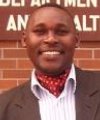Oscar Kamau Kingara | |
|---|---|
 | |
| The Oscar Foundation | |
| Personal details | |
| Born | 14 June 1971 Kiambu, Kenya |
| Died | Friday, March 5, 2009 (aged 38) University Way, Nairobi |
| Spouse | Nancy Wangeci Munene (m. 1997) |
| Children | Natalie, Naima |
| Occupation | Lawyer, politician, human rights activist |
| Website | oscarfound |
Oscar Kamau Kingara (July 14, 1971 - March 5, 2009) was a Kenyan lawyer and human rights activist. Kingara was the founder and director of the Oscar Foundation Free Legal Aid Clinic, a human rights organization based in Nairobi. [1] His 2009 assassination is widely attributed [1] [2] to his work in documenting police killings. [1] [3]